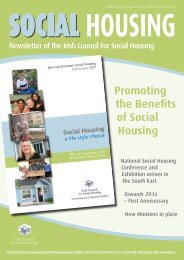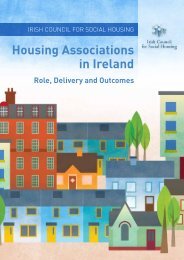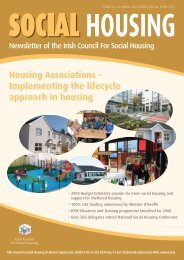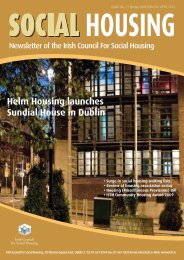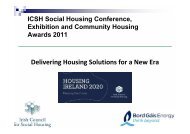National Housing Strategy for People with a Disability 2011 - 2016
National Housing Strategy for People with a Disability 2011 - 2016
National Housing Strategy for People with a Disability 2011 - 2016
You also want an ePaper? Increase the reach of your titles
YUMPU automatically turns print PDFs into web optimized ePapers that Google loves.
medical certificates. Their application <strong>for</strong>m includes consent <strong>for</strong> the local authority tocontact medical services. The following three questions govern these enquiries:What services are working <strong>with</strong> the person?Is the person capable of independent living?Where is the most suitable place to house this person?Particular care is taken when a person is moving into the private rented sector <strong>with</strong> rentsupplement, to ensure that the accommodation is suitable and of a reasonable standard.This is considered important from a sustainability point of view. Regular contact <strong>with</strong>tenants provides an early warning system if problems should arise that might require theintervention of the local mental health team. In this way, problems are identified at anearly stage and can be tackled be<strong>for</strong>e becoming more entrenched. Early identification ofrent arrears was also considered important in preventing the situation.Monaghan County Council and St Davnet’s have established good communication links andboth service providers seek to be consumer-orientated, <strong>with</strong> the intent of providing longtermsolutions that are best served through cooperation at the early stages of planning.These relationships are well-established, and are maintained even when staff move on.Specific <strong>Housing</strong> Needs of <strong>People</strong> <strong>with</strong> a Mental Health <strong>Disability</strong>9.26 It is recognised that effectively meeting the housing needs of people <strong>with</strong> a mentalhealth disability requires an integrated, flexible and responsive approach and should beaddressed as part of mainstream housing policy. Furthermore, it is recognised that people<strong>with</strong> a mental health disability can be at greater risk of homelessness. The key issuesoutlined below have been recognised as areas which must be addressed in order to achievesustainable housing <strong>for</strong> people <strong>with</strong> a mental health disability. More broadly, it isrecommended that, in order to support housing authorities and voluntary agencies in theprovision of housing services, specific guidance on responding effectively to the housingneeds of people <strong>with</strong> mental health disabilities should be developed. It should be notedthat the <strong>National</strong> Office <strong>for</strong> Mental Health at the HSE has established a social housingadvisory group to develop guidance <strong>for</strong> HSE mental health services on the engagement ofmental health services in issues relating to the housing needs of service users in the contextof the implementation of both A Vision <strong>for</strong> Change and the new <strong>Housing</strong> <strong>Strategy</strong> <strong>for</strong> <strong>People</strong><strong>with</strong> a <strong>Disability</strong>. The group includes representation and expertise from mental healthservices, local authority housing services, mental health service users, carer and advocacygroups and the social housing sector.112112



